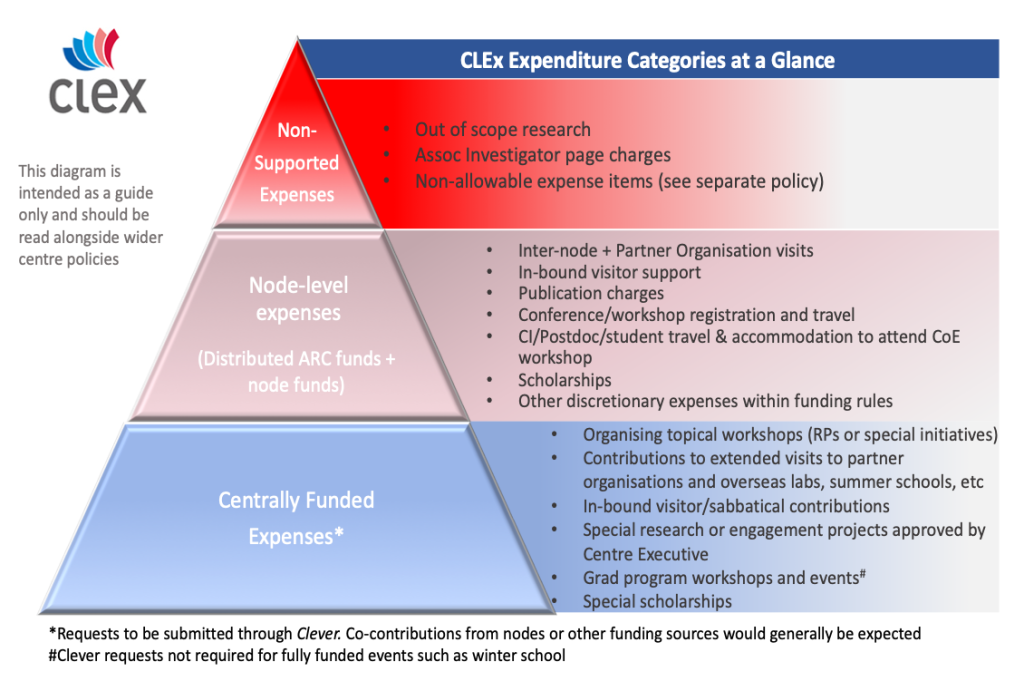
Seeking approval
We are trying to make funding across the Centre, opportunities for PhD and postdocs and so on as equitable as possible in a resource constrained world.
Decisions on funding for travel and other activities will be supported based on funding availability, CLEX priorities, and in consultation with supervisors and node leads.
The usual steps for PhD students and Postdocs to follow when seeking funding for travel etc. are:
- Speak to your supervisor – if they do not support your request then it’s not likely to be supported by the Centre.
- If approved to travel, seek funding from local node
- discuss with your supervisor;
- discuss with your node Lead
- If the node is unable to cover your expenses, you may request Central support. To do this, submit a funding request via Clever explaining the purpose of the request, how your node is supporting you and so on. Please refer to the funding triangle below to see how appropriate it is to request central funds.
Regardless of the source of funding, Centre affiliated students and funded staff should expect to:
- be funded to attend the annual workshop (travel and accommodation)
- have access to support (or partial support) to visit other nodes and partners
- attendance at face-to-face Researcher Development Program activities, such as winter school, and writing workshops, upon acceptance of application.
How the CLEX budget works
The Centre receives its funding in three ways:
- Directly from the ARC
- Directly from each University (sometimes known as “node funds”)
- From a handful of other sources for specific projects.
When the Centre was formed, there was an agreement on how the ARC budget would be split to each University and a budget model was agreed. Written into the agreement is how much cash each University would contribute to CLEX. Therefore, the total budget at each of the five nodes is made up of ARC funds, Node funds and possibly funds from other sources targeted to special projects.
CIs at each node determine how the total pool of funds from various sources is budgeted and administered, consistent with the funding rules of the Centre agreement and with oversight from Vilia Co, Stephen Gray and Andy Pitman. There is also a limited discretionary budget of “central funds” from the ARC allocation retained at UNSW to resource cross-centre initiatives and special projects. We note that in preparing the overall ARC and university budgets, we decided to distribute as much money as possible out to each university. That means that most of the Centre’s funds sit within each University and the Central budget is relatively constrained.
Inherent in the Centre agreement is the understanding that funding from each university does not leave the university. Each node also has discretion in terms of the number of students and AIs it chooses to affiliate to CLEX. This means that there are differences in the amount of funds available between universities and resources may appear better at Institution X in comparison to institution Y, especially since the size of each University’s CLEX group changes over time.
In building their budgets, each node can decide to prioritise overseas travel, or domestic travel, or PhD scholarships and so on depending on the priorities set by an individual node. A University where there are virtually no PhD scholarships, but good resourcing of travel would invest their CLEX funding differently from a University with many PhD scholarships available. Again, this leads to inevitable differences between institutions. Central funds cannot be used to normalise these differences – so if University X decides to invest primarily in international travel, central funds are not available resource all domestic travel. Students and postdocs may apply for central support, via clever, for extended research visits or attendance at summer schools that cannot be fully supported via node funds. These will be considered on a case-by-case basis and co-contributions from nodes or other sources would be expected.
We further note that Chief Investigators have formal responsibilities to deliver research outcomes, engage in the centre etc. It is therefore normal that Chief Investigators get some discretionary funding to support these activities. They may choose to use these to support their students and research fellows. That tends to mean students and postdocs closely linked with Chief Investigators have more access to travel funds than others. However, all CLEx students, regardless of whether they are supervised by a CI or an AI, will have equal access to Researcher Development Program activities like winter schools.
The figure below points to which source of funds you might seek to access. These are not formal, non-negotiable rules. They are fairly strong guidelines that underpin decision making for each of the three key steps on the previous page.
